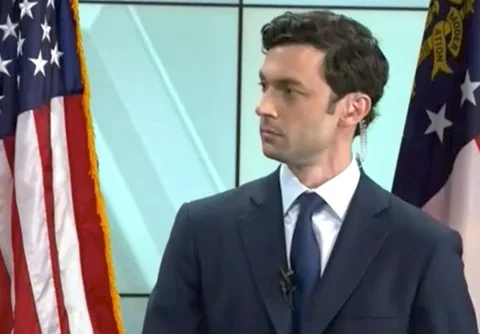Not to get too off-track, but this alone is an argument for Congressional term limits – in every cycle there’d at least be a chance that some portion of Congress might use moral and ethical guidance to direct their vote, rather than whatever short-term political calculation will pay off best in the next election.
When the congressional maps were redrawn it placed Kinzinger in a heavily red district that already had an incumbent republical congressman, so Kinzinger opted to retire instead. So, he chose to be part of the committee before his district was removed from him. An imminent departure was not a factor in this case.
For sure, it was a choice on K’s part to do this rather than to duke it out with another Republican in a primary. But his choice still allowed him a more principled stance than he might have taken if he’d been running again. Term limits would (hopefully!) provide the same opportunity on an ongoing basis.
Every study I’ve seen shows that term-limits give more corporate influence. This happens to be a political fight without a strong corporate interest. If you look at retiring congresspeople each year, you usually see them keeping their head down trying to line up their next corporate gig after they leave office.
This is also a problem we need to solve. No reason you couldn’t address both issues in the same bill. (Other than Congress’s disinterest in limiting their own power.)
It wouldn’t if you banned corporate contributes and limited lobbying, and ban people going directly to corporations after their term in office.
This is a problem in the current configuration, but if we took this kind of corruption seriously, it’s a problem we can tackle.
I’m really sick of people saying we can’t fix our problems because of the way things are now. If human beings were incapable of problem solving, then we’d still be living in small nomadic bands, hunting and gathering… Human beings have solved MUCH more complicated problems than corporate influence in politics.

If you do that, though, do you actually need the term limits?
I’d argue it’s still a good idea. You can’t eliminate all forms of grift or corruption, but you can curtail and punish it. And this would be one way to ensure that if someone who has ill intent or selfish intent does get elected, their time that they can do actual damage is limited.
That cuts both ways though. It can take a little time for a new legislator to find their footing, and drafting complex, effective federal legislation can take some time to get right. Plenty of good lawmakers were at the job for years before succeeding in getting some of their signature policies enacted.
What’s your favorite piece of legislation that made it through Congress in the last few decades? Odds are it wasn’t written and sponsored by freshman lawmakers.
This is the biggest reason against term limits that I’ve seen. At least against relatively short limits. It takes time to get good at the job. I know when we hire someone, I don’t expect them to be an expert on how the company processes for at least 6 months, and our company is way simpler than the U.S. Congress.
Which means, the only people that are good with lots of experience reading and writing legislation and with how to navigate through the process become the lobbyists. Lobbyist already have too much input into how legislation is written. Term limits could just solidify this as the lobbyist becomes the only expert and who the more frequently new politicians need to lean on for support.
Then, we add in solving that lobbyist problem. However, if we’ve managed to solve the lobbyist problem, do we really need the term limits anymore or did we solve the actual root problem already then?
Likewise, if we solve other voting problems, especially ones that create “safe” seats, minority winners, and other things that advantage the incumbent. Then, the term limit doesn’t matter so much.
Better yet, limit campaign spending and timing. No campaigning or fundraising until less than six months out from the election.
Methinks a seperate topic on Term Limits is warranted here.
Done.
A reasonable amount of time to get into the job and contribute can be worked into the process. It doesn’t follow that they should have an unlimited time in congress, though. And people hanging onto a seat for decades can entrench backwards and retrograde thinking that can hinder actual progress. Just because John Lewis was an effective legislator (and very progressive) and we were all lucky to have him in congress for years doesn’t meant that term limits don’t have significant downsides (a certain legislator who literally filibustered civil rights several time comes to mind).
Being in congress is not the only way people can meaningfully contribute to the common good or to good governance. But the system we have now (including no term limits and gerrymanding) has contributed to an entrenched ruling class by default. It’s pretty difficult for new people to get into the system, because they are kept out by those already in power. No one is arguing that all of those people are “bad” or ineffective, or corrupt (maybe some are, not me, though). But it’s one point of change we can make, that seems to have bipartisan support, to improve our system and make it more democratic.
I heartily agree with almost everything said. I wasn’t trying to discourage addressing these issues and I was probably too terse since I didn’t want to pull things off-topic in the original thread. Every study I’ve seen showed term-limits when implemented showed further entrenchments of special-interests. I’m open other studies or to hear why those examples wouldn’t apply (parliamentary systems vs the US’ or they only covered shorter term-limits, for example). My worry is that it would make the problem worse. Something like an age cap does seem appropriate because power does seem too entrenched and there doesn’t seem to be much fostering of new leadership. We already have age minimums.
My unsolicited take on term limits.
-
You have to have spent at least 4 years in local elected government before running for congress or senate.
-
Limited to no more than 12 years as congressperson (2 year terms)
-
Limited to no more than 12 years as Senator (6 year terms)
-
All elections for congress or senate decided by single transferable vote ballot method. No primaries needed.
-
Campaigns limited to no more than 90 days.
-
Eliminate the electoral college.
This strikes me as perhaps too generous…
On the one hand, the thing that has always made me hesitant about term limits for congress is the fact that, yes, politician is a profession, and presumably career politicians will be better at the business of politics than a constant stream of neophytes.
On the other hand, we’ve seen time and again that career politicians put the continuity of their career above all other interests, in particular against the interests of the constituents that they supposedly represent. (This is the classic systems problem of systems valuing intrinsic goals over extrinsic ones.)
I don’t want the country run by newbies, but I also don’t want the country run by people whose only interest is winning the next election.
Anyway.
24 years as a member of Congress is… a long time. That’s a full professional career. OK, it is better than the status quo where we have people lingering in “safe” seats for 30, 40, 50 years. But can we do better? Is 12 years too short?
Even better, I wonder if there are ways we can disarm the liabilities of long-term Congressional careers without term limits (or without absurdly restrictive term limits). A total ban on Congresspeople trading on the stock market (or at least having any control whatsoever of their portfolio while serving) seems obvious. Moratoriums on joining lobbying firms, policy groups, or corporations with vested interests in Congressional regulations after retirement. Maybe there are ways to make incumbency a more explicit confidence vote on someone running for re-election? (Ditching FPTP – as you mentioned – would be a big help here, for sure.) Maybe with some or all of those in place, 24 years would be a good limit.
This I like. Would this require a Constitutional amendment?

I picked 12 years just so it would line up with the limit I imposed on senators. No more thought to it than that, other than you do need time to figure out your job as alluded to earlier.
Would an ammendment be needed to force a local governance role? Probably. I am not a constitutional lawyer.
But is this due to term limits or due to other factors?
But it’s not because the people are older that they are entrenched in power, it’s because they have been there for so long.
Also, @Otherbrother - previously, you noted congress people getting their footing, and that having people in congress for a while have a kind of institutional knowledge. I’d argue that both of our current senators (in GA) are both new and seem to have some accomplishments under their belts. Institutional knowledge doesn’t just come from the politicians, but their staff, many of whom move around through the course of their career to different offices and very much have that institutional knowledge. It’s really on a MOC to hire people who are going to help them accomplish their goals. There are certainly also people who work for the body who have constitutional knowledge.